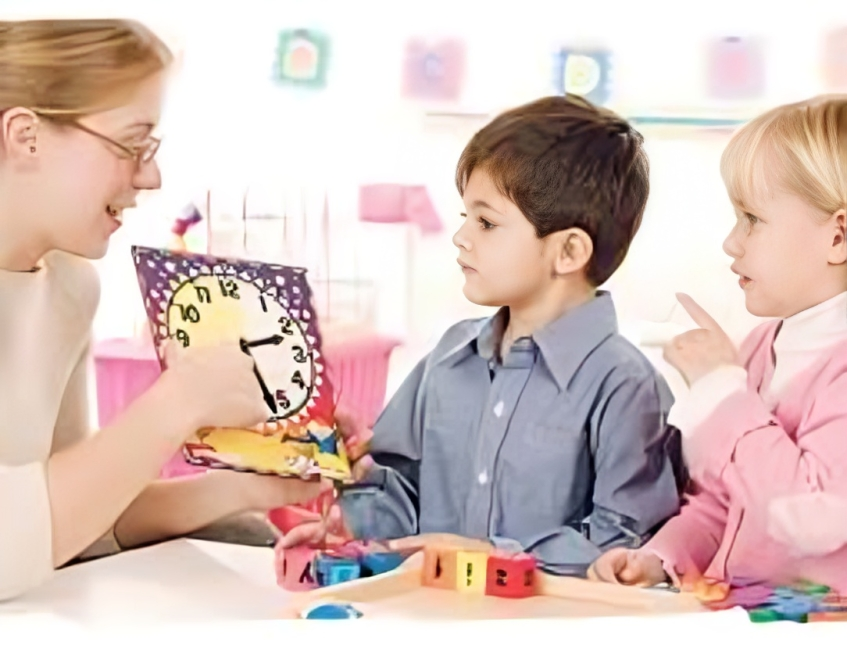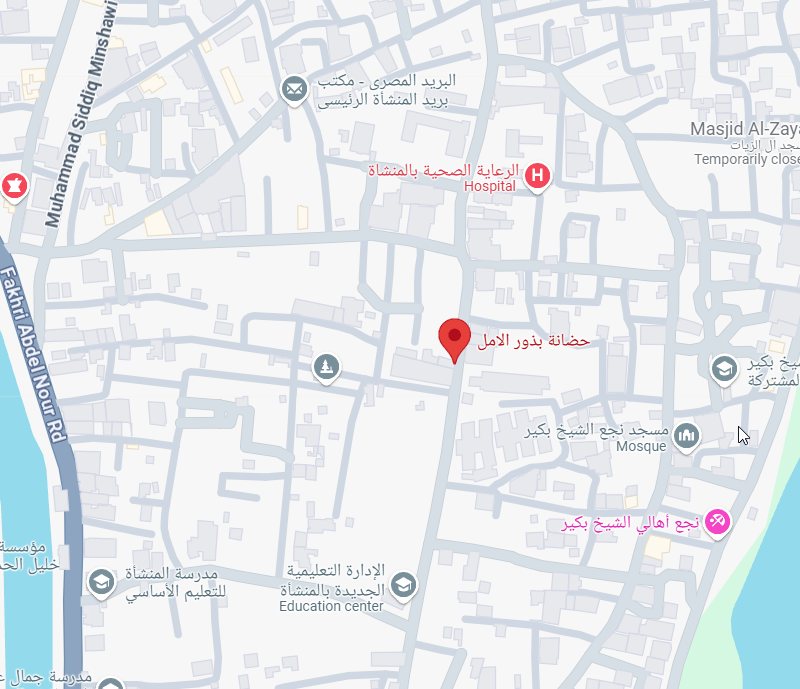Seeds of Hope Kindergarten is one of the most distinguished kindergartens in Sohag Governorate, focusing on providing a safe and stimulating environment for the development of children's skills in various fields. The kindergarten relies on an innovative educational approach that combines traditional and interactive teaching methods, promoting critical thinking and creativity among children. It offers diverse programs, including educational games that stimulate creativity, art workshops that contribute to developing drawing and music skills, and sports activities that improve physical fitness and motor coordination. Additionally, the kindergarten ensures a healthy and safe environment, with strict sanitation and hygiene protocols, giving parents confidence in the high-quality care provided to their children.
Seeds of Hope Nursery
Seeds of Hope Kindergarten is one of the most distinguished kindergartens in Sohag Governorate, focusing on providing a safe and stimulating environment for the development of children's skills in various fields
- Phone: 01208158159
- Website:
- Opens at: 07:00
- Closes at: 19:00
Seeds of Hope Nursery
🌟 About Seeds of Hope Nursery
Features of Seeds of Hope Nursery
📚 Innovative Educational Curriculum:
The nursery offers a state-of-the-art educational program that embraces global pedagogical standards. The curriculum is designed to foster children's critical and creative thinking through interactive activities that make learning fun and engaging. It focuses on building essential skills such as language, numeracy, and science, adapting to each child's individual needs.
🧸 Safe and Healthy Environment:
Seeds of Hope Nursery prioritizes the safety and wellbeing of its children. The facilities are equipped with the latest security measures—including surveillance cameras and early-warning systems—and are regularly sanitized using approved disinfectants. This commitment ensures a clean, secure environment where children can thrive without exposure to harmful materials or risks.
👨🏫 Specialized Teaching Staff:
The nursery’s team consists of highly qualified educators with extensive experience in early childhood education. Every teacher is carefully selected and continuously trained in modern pedagogical techniques, ensuring that every child's unique needs are met with personalized, high-quality instruction and guidance.
🎨 Diverse Recreational and Educational Activities:
At Seeds of Hope Nursery, children enjoy a wide range of engaging activities designed to boost their intellectual, creative, and physical development. These include:
Interactive educational games that promote logical thinking and problem-solving.
Art workshops (painting, sculpture, and creative arts) to nurture artistic expression and innovation.
Physical activities that enhance motor skills and promote teamwork.
Music and movement sessions that support both cognitive and social development.
👩👧👦 Continuous Communication with Parents:
The nursery establishes a strong communication channel with parents through regular, detailed progress reports and scheduled meetings. This ongoing dialogue ensures that parents are fully informed about their child's development and can actively contribute to supporting their learning journey.
🍽️ Healthy and Balanced Meals:
Nutrition is a key focus at Seeds of Hope Nursery. The meals provided are meticulously prepared using fresh, high-quality ingredients to meet stringent dietary standards. These balanced meals—including fruits, vegetables, proteins, and whole grains—are designed to support optimal physical and mental growth, with special options available for children with dietary restrictions or allergies.
🩺 Comprehensive Healthcare:
Seeds of Hope Nursery offers integrated healthcare services, with a dedicated medical professional available on-site to monitor children's health throughout the day. Regular health check-ups are conducted to ensure that every child remains in excellent condition, and prompt first aid is administered in case of emergencies.
🎉 Special Events and Activities:
The nursery regularly organizes unique events and celebrations, including seasonal festivals, national and religious holidays, as well as educational field trips. These events are crafted to enhance social interaction, cultural awareness, and foster a sense of community, while allowing children to apply their learning in dynamic, real-world settings.
📞 Contact Seeds of Hope Nursery:
Address: Industrial Secondary (Baniin), Sohag Al-Mansha, Souk Street beside a school, Sohag Governorate
Phone: 012 08158159
💫 Conclusion
Seeds of Hope Nursery is not just a place of learning—it is a nurturing ecosystem focused on building character and unlocking the innate potential of every child. With its innovative curriculum, safe and healthy environment, and a dedicated team of professionals, the nursery lays a strong foundation for future success. It is the perfect choice for parents seeking an exceptional early education experience that cultivates knowledge, self-confidence, and the ability to overcome future challenges.
FAQ
Nurseries in Egypt are divided into several types based on their goals and educational content, including:
1. Educational Nurseries:
Focus on teaching children the basics of reading, writing, and languages. They often follow curricula like Montessori or the British system.
2. Developmental Nurseries:
Aim to enhance social and behavioral skills such as discipline, cooperation, and independence.
3. Religious Nurseries:
Focus on Quran memorization and teaching religious values and ethics in a conservative environment.
4. Specialized Nurseries:
Cater to specific groups such as:
Children with special needs.
Language-focused nurseries (e.g., French – German).
Art or sports-oriented nurseries.
5. Governmental and Private Nurseries:
Governmental: Low-cost and supervised by the Ministry of Social Solidarity.
Private: Run by individuals or private institutions, and vary in quality and services offered.
Tip: Choosing a nursery should be based on the quality of care, safety, and the level of individual attention given to each child.
The Egyptian law outlines several key objectives that nurseries aim to achieve, including:
1. Comprehensive Social Care:
Providing a safe and stimulating environment that takes care of the child physically, psychologically, and socially.
2. Development of Skills and Abilities:
Supporting children's talents and discovering their abilities through age-appropriate educational and recreational activities.
3. Integrated Preparation:
Preparing the child physically, culturally, psychologically, and morally in alignment with Egyptian societal values and religious identity.
4. Communication with the Family:
Raising awareness among parents and providing educational guidance to support proper parenting at home.
5. Strengthening Social Bonds:
Building a strong, interactive relationship between the nursery and the child’s family to ensure a continuous, well-rounded environment for growth and learning.
Note:
Nurseries are not just places to keep children, but they are key partners in education, laying the foundation for a strong and socially responsible personality for the child.
Nurseries have several important aspects that contribute to the child’s overall development:
1. Educational Aspect:
By providing educational and developmental activities, such as learning numbers, letters, and language basics, nurseries help children develop their cognitive skills.
2. Social Aspect:
The nursery provides a social environment that allows children to interact with their peers, learning communication skills, cooperation, and problem-solving.
3. Emotional Aspect:
Through emotional support from teachers, children learn how to manage their emotions and develop self-confidence.
4. Physical Aspect:
Physical activities help children develop fine and gross motor skills, such as running, jumping, and playing with educational toys.
5. Creative Aspect:
Creative activities like drawing, modeling with clay, and music help enhance children's imagination and boost their creative skills.
All these aspects work together to develop a well-balanced personality in children, enabling them to adapt to various aspects of life.
Here are 8 steps to ease the child’s transition to pre-school:
1. Visit the school together:
Introduce the child to the school environment beforehand so they can acclimate to it.
2. Meet new friends:
Encourage the child to meet other children so they can make new friends.
3. Role-play school:
Use school-related games at home to demonstrate the daily school routine.
4. Turn skills into games:
Make learning skills like dressing fun and engaging for the child.
5. Talk about your experience:
Share your own school experiences to create a positive image of school for the child.
6. Establish a new routine:
Set a regular daily routine to prepare the child for school.
7. Listen to your child:
Pay attention to the child’s feelings and concerns about school.
8. Create a comforting goodbye plan:
Make the child’s farewell comfortable and encouraging.
These steps help ease the child’s transition to a new stage.
Nursery is extremely important for children because it helps prepare them for the next educational stage and promotes their social and cognitive development. Through nursery, children learn how to build social relationships outside of the family, which enhances their communication and cooperation skills.
Nursery also contributes to developing critical thinking in children, helping them understand and analyze situations more effectively. It encourages a positive attitude towards learning, fostering their love for exploration and independent learning.
Additionally, nursery helps build the child’s self-confidence, which enables them to adapt better to the school environment in the future and enhances their ability to persevere and succeed.


